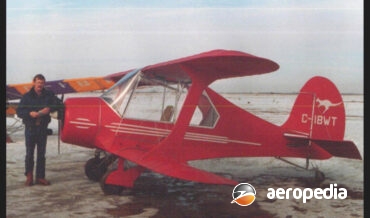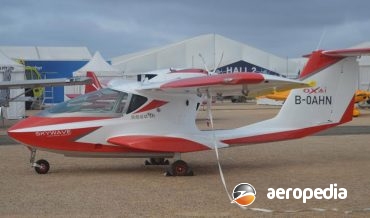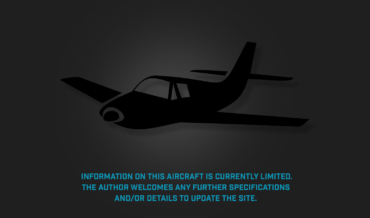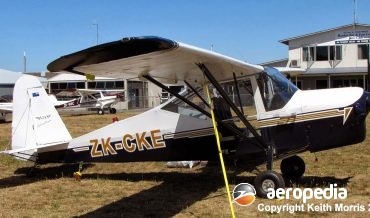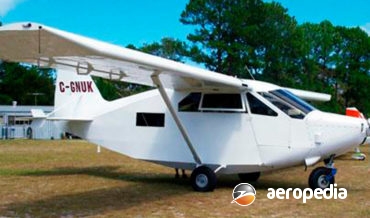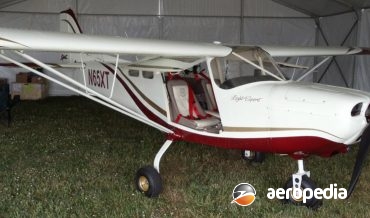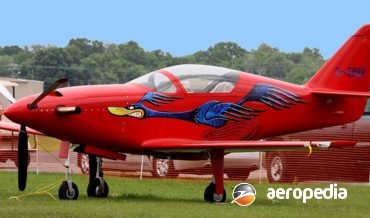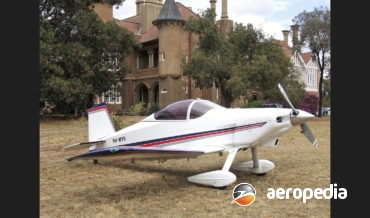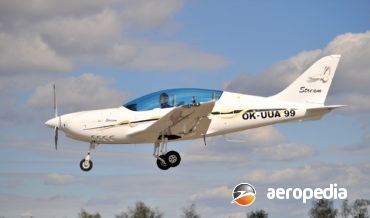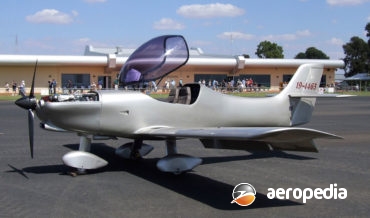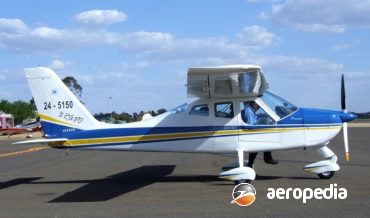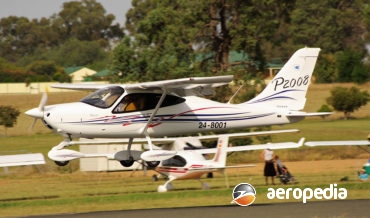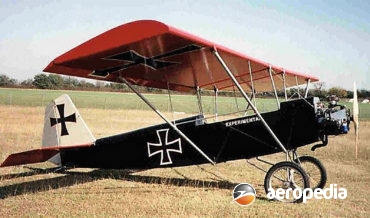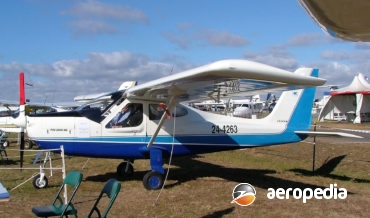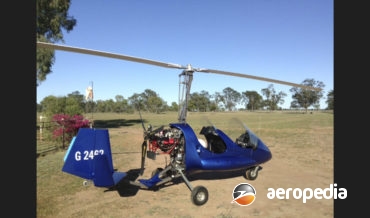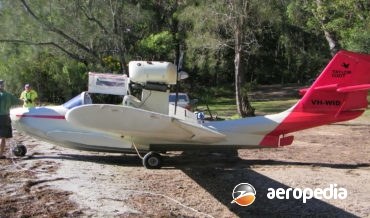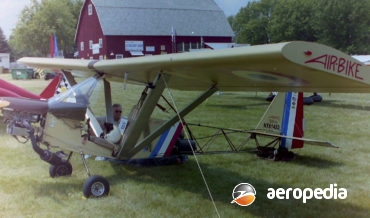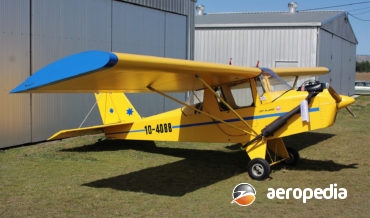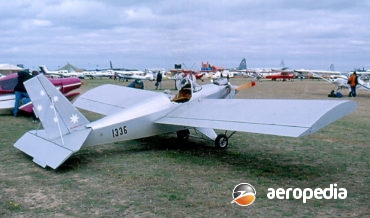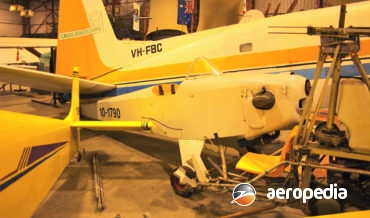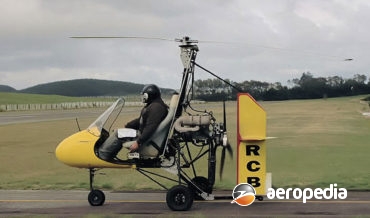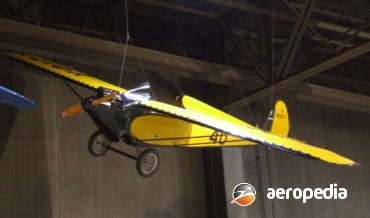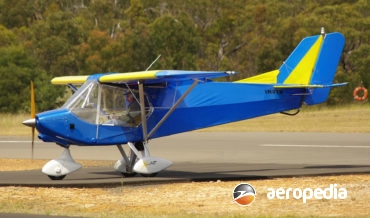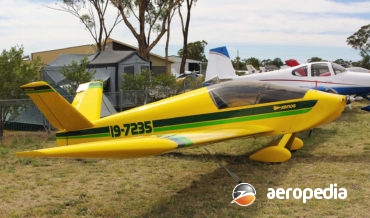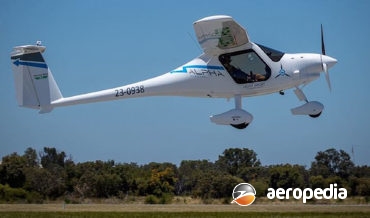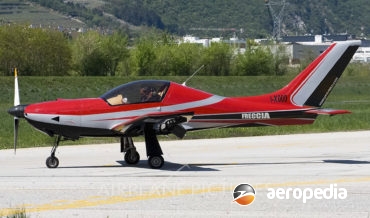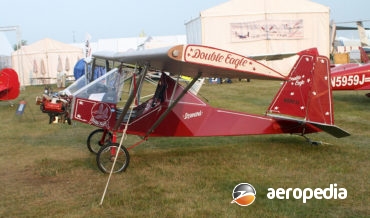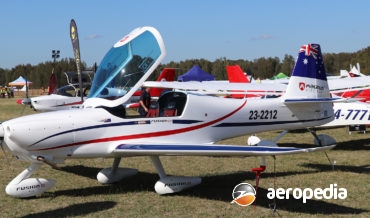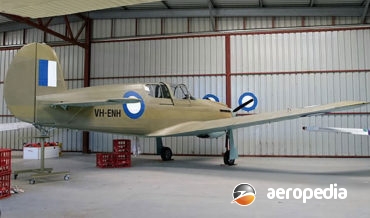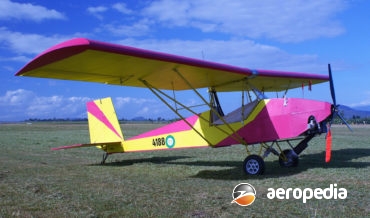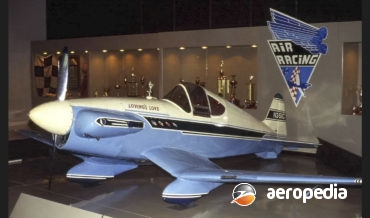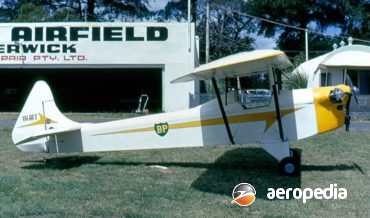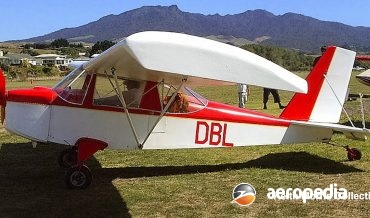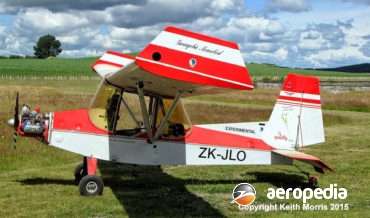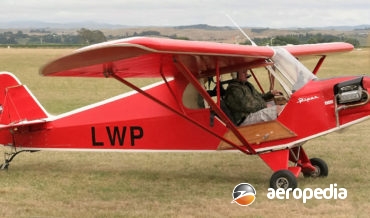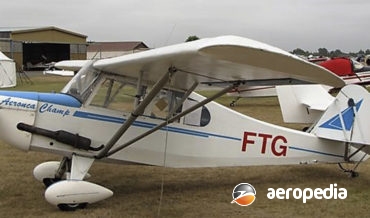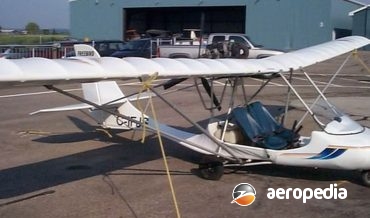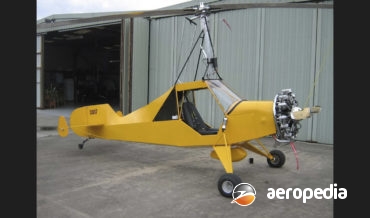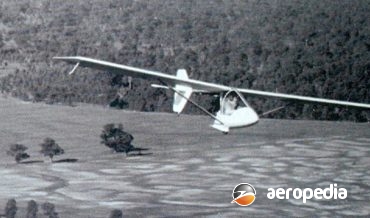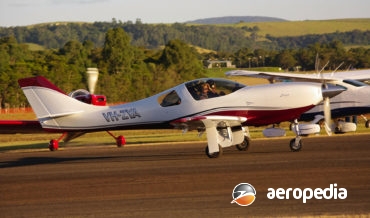All Contents
Contents
The Startech ST-1 was one of a few designs by Anthony Shennan, an Australian, who designed the BeachBoy Staggerwing, Beach Boy ultralight, and light sport aircraft.
David C. Eyre
- June 26, 2020
The M-2 Skywave is one of a new series of carbon fibre two-seat light sport aircraft introduced to the market in the 21st Century and is similar in appearance to the Icon M-5 from the United States and the Vickers Wave produced at New Plymouth in New Zealand.
David C. Eyre
- March 23, 2020
The Slepcev Me 109G-2 was a 75% per cent scale replica of the Luftwaffe Messerschmitt Bf 109G-2 fighter aircraft of World War II.
David C. Eyre
- March 23, 2020
The Adventurer is a single-engine two-seat light sporting high-wing monoplane built in New Zealand by Mr Bruce Cooke.
David C. Eyre
- May 17, 2019
The Wilson Explorer II, also known as the Private Explorer II, was designed by Dean Wilson and was a development of the twin-engine Global Explorer which was designed and built for French explorer Hubert de Chevigny.
David C. Eyre
- May 8, 2019
The spirit was designed by Mr.Max Tedesco and is built by a joint American and Colombian company, the World Aircraft Company, for the light sport aircraft market and was shown for the first time to the public at AirVenture at Oshkosh in 2011.
David C. Eyre
- May 8, 2019
In the 1990s Performance Aircraft designed the Legend as a high performance sport aircraft for amateur construction but the Company was later acquired by Legend Aircraft of Winnsboro of Lousiana.
David C. Eyre
- May 8, 2019
Designed by John Thorp in the USA, the T-18 has been one of the most popular home-built light aircraft for amateur construction, hundreds having been built around the world.
David C. Eyre
- May 8, 2019
The TL Ultralight Stream is one of a series of light sport aircraft produced in the Czech Republic by TL-Ultralight of Hradec Kralove and is a two seat in tandem light sport aircraft for private use.
David C. Eyre
- May 8, 2019
The Cobra Arrow is an Australian designed and built light two-seat high-performance aircraft aimed at the sporting pilot, designed by Thomas Wickers, being supplied by the manufacturers, known initially as Tomair but later as Cobra Aviation, in kit form to the amateur constructor.
David C. Eyre
- May 8, 2019
The Bravo was a development by the Italian manufacturer of the popular series of light aircraft to meet the United States Light Sport Aircraft (LSA) class of flying machine as defined by the Federal Aviation Administration.
David C. Eyre
- May 8, 2019
The Tecnam P-2008 Gran Turismo (Grand Tourer) was released to the market by the manufacturers, Tecnam, in Italy in 2009. It was an all-new design combining a carbon-fibre fuselage with a metal wing and stabilator.
David C. Eyre
- May 8, 2019
The Texas Parasol was a cheap to build light aircraft designed along the lines of Charles Beeson’s Chuckbird which was built near San Antonio, Texas, and more than 60 examples were completed.
David C. Eyre
- May 8, 2019
The RG series of aircraft produced by Tecnam was developed to meet the needs of a number of customers for variants with retractable undercarriages and two basic models have been produced, the high-wing P2000 RG and the P2002 JR-Retractable/CSU with a low wing.
David C. Eyre
- May 8, 2019
The Titanium Explorer gyrocopter was designed by Neil Sheafer and built at Tamworth, NSW, he being previously the Australian importer for similar in appearance Autogyro Europe gyrocopters imported from overseas.
David C. Eyre
- May 8, 2019
Designed by Moulton B ‘Molt’ Taylor in 1969, the first of two prototypes of this series (N1070) flew for the first time in February 1971 and was known as the Coot Model A. Fitted with a 90-kw (120-hp) Franklin 225 engine, the aircraft completed 100 hours of flying before being
David C. Eyre
- May 8, 2019
The Team Airbike, also known as the Ison Airbike, was designed to meet US FAR103 regulations and has been produced in single and two-seat variants, the latter being licenced as an ultralight trainer or as an amateur-built aircraft.
David C. Eyre
- May 8, 2019
The Hi-MAX is one of a series of ultra-light aircraft designed to be built by amateur builders and to be registered under ultra-light regulations.
David C. Eyre
- May 8, 2019
The Mini Max is one of a range of low-cost ultra-light aircraft designed and developed by Team Inc (Tennessee Engineering & Manufacturing) of Bradyville, Tennessee, and built in large numbers for the light aircraft market.
David C. Eyre
- May 8, 2019
For many years Team Incorporated of Bradyville, Tennessee produced a range of ultralight aircraft for the sport aircraft market, these being produced in kit form for the amateur builder with limited finance.
David C. Eyre
- May 8, 2019
Rotor Flight Dynamics Inc of Wimauma, Florida has for some years been producing single and two-seat gyrocopters using the patented Dragon Wing Rotor, the Dominator being designed by Ernest Boyette.
David C. Eyre
- May 8, 2019
In the late 1920s James Church built a light aircraft known as the Church Midwing JC-1 for racing using the fuselage of a Heath Parasol, the aircraft being a wire-braced mid-wing aircraft.
David C. Eyre
- May 8, 2019
The Hanuman is one of a series of light sporting aircraft produced in India by Raj Hamsa, this machine being designed to accept a large range of engines to meet customer needs, these including the Jabiru 2200, Rotax 912, Rotax 914 and the Hirth series of four-cylinder units.
David C. Eyre
- May 8, 2019
Following the success of other aircraft in the Sonex range, John Monnett designed the Xenos which is aimed at bringing the cost of motor gliding to an affordable level.
David C. Eyre
- May 8, 2019
The Alpha Electro is one of the first of a new generation of light training aircraft powered by electric motors and has been developed by Pipistrel, which is based in Slovenia’s Vipava Valley.
David C. Eyre
- May 8, 2019
The Freccia is one of a series of light aircraft designed and developed in Italy by Pro Mecc of Corigliano d’Otranto, being first shown to the aviation world at the Aero Show held in Friedrichshafen in 2011 It is supplied as a complete ready-to-fly aircraft and has been popular on
David C. Eyre
- May 8, 2019
The Double Eagle was designed by Leonard Milholland in the United States as a basic ultra-light aircraft and is a two-seat plans-built development of the Legal Eagle.
David C. Eyre
- May 8, 2019
The Magni series of autogyros is produced by Magni Gyro di Magni Vittoria at Besnate in Italyfor the worlds light sports aircraft market. The M-14-Scout 2000, known as the Millenium model, has either the Rotax 914 turbo engine of 86-kw (115-hp) or Rotax 912 ULS 75-kw (100-hp) engine installed.
David C. Eyre
- May 8, 2019
The Loehle Aircraft Corp is based in Wartrace, Tennessee in the United States and has in recent years produced a series of ¾-scale replicas of World War I and II fighters in kit form, the latter included the P-40 Kittyhawk, the Supermarine Spitfire, and the North American Mustang. The
David C. Eyre
- May 8, 2019
The Sport Parasol is a single-seat light, simple, wooden aircraft with fabric covering produced by Loehle Aircraft Corp of Wartrace, Tennessee to meet a market for a cheap, light, easy to build ultralight. Wings are detachable for storage and trailering.
David C. Eyre
- May 8, 2019
The WR-1 Love was a single-seat high performance gull-wing monoplane designed in the 1950s by Neal Loving and built by Wayne Aircraft Co of Detroit, Michigan. It flew for the first time on 7 August 1950 and qualified as a ‘midget racer’ under NAA rules on 18 August 1951. Sets
David C. Eyre
- May 8, 2019
The Luton LA-4 Minor single-seat, ultra-light aircraft was designed by Luton Aircraft in the United Kingdom in 1936. The prototype was flown in that year fitted with a 26-kw (35-hp) Anzani engine. Subsequently it was modified to make the design more suitable for amateur construction, and a number were built
David C. Eyre
- May 8, 2019
Two examples of this ultralight aircraft have been completed in New Zealand and commenced life as kits for the Team HiMax but were extensively modified during construction.
David C. Eyre
- May 8, 2019
In the 1950s two brothers, James and William Lobet, who were residents in the south of France, showed an interest in aircraft and designed and built a range of gliders to meet their needs.
David C. Eyre
- May 8, 2019
This is one of a series of light aircraft kits produced by Light Miniature Aircraft of Keechobee, Florida in kit form for amateur construction.
David C. Eyre
- May 8, 2019
Light miniature Aircraft of Okeechobee, Florida, is a company which has produced replicas of light aircraft of the 1950s to various scale, these including the LM-2X-2P 7/8th scale replica of a Taylorcraft.
David C. Eyre
- May 8, 2019
The Classic is one of a series of ultra-light aircraft produced by Free Bird Innovations Inc of Detroit Lakes, Minnesota.
David C. Eyre
- May 8, 2019
Little Wing Autogyros of Mayflower, Arizona, has for some years now produced a series of light single-seat fully enclosed tractor autogyros.
David C. Eyre
- May 8, 2019
The Hitchhiker was designed, built and marketed by Robert Labahan of Seville, VIC in the mid 1980s as a single-seat, open-cockpit ultra-light suitable for cross-country and short field operations.
David C. Eyre
- May 8, 2019
The Legacy is one of a range of aircraft produced by Lancair, formerly known as Neico, for the kit-built market and is a high-performance private owners touring machine, being an up-dated variant of the Lancair 320.
David C. Eyre
- May 8, 2019
Recent Comments
Archives
Categories
- No categories
Categories
- No categories
Latest Posts
Newsletter

